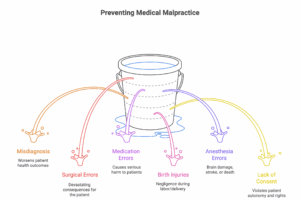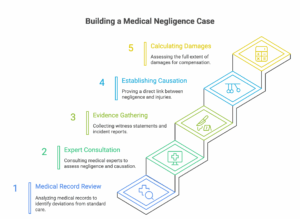When you entrust your health to a medical professional, you expect a certain level of care. Unfortunately, sometimes that care falls short, resulting in injury or even death. This is where the concept of medical malpractice comes into play. If you suspect you’ve been harmed by a doctor’s negligence, understanding your rights and how a medical negligence lawyer can help is crucial.
What is Medical Malpractice?
Medical malpractice occurs when a healthcare provider’s actions deviate from the accepted “standard of care,” resulting in harm to a patient. This standard of care represents the level of skill and treatment that a reasonably competent healthcare professional, in the same specialty and with similar training, would have provided under similar circumstances. If a doctor, nurse, or other healthcare professional fails to meet this standard, they may be liable for medical negligence.
Consider this: A surgeon accidentally nicks a major artery during a routine procedure, causing severe bleeding and requiring emergency surgery to correct. If a review shows that this type of injury rarely occurs during this procedure when performed by competent surgeons, it could be considered medical malpractice.
Why You Need a Medical Malpractice Lawyer After Suspected Negligence
Proving medical malpractice is a complex process. Medical professionals and hospitals often have robust legal teams dedicated to protecting their interests. Going up against them alone is incredibly difficult. A qualified medical malpractice lawyer understands the intricacies of medical law, medical procedures, and the legal process. They can:
- Investigate your claim: A lawyer will thoroughly review your medical records, consult with medical experts, and gather evidence to determine if negligence occurred.
- Understand the Law: Each state has specific laws and statutes of limitations regarding medical malpractice claims. Your lawyer will ensure your case is filed correctly and within the allowed timeframe.
- Build a strong case: This involves gathering evidence, securing expert witness testimony, and presenting a compelling argument to demonstrate the healthcare provider’s negligence caused your injuries.
- Negotiate with insurance companies: Insurance companies are notorious for trying to minimize payouts. A lawyer will fight for fair compensation on your behalf.
- Represent you in court: If a fair settlement cannot be reached, a medical malpractice lawyer will represent you in court, presenting your case to a judge and jury.
Identifying Medical Negligence: Common Examples
Medical malpractice can take many forms. Here are a few common examples:
- Misdiagnosis or delayed diagnosis: Failing to accurately diagnose a condition or delaying diagnosis can lead to worsened outcomes. A well-publicized example involves the delayed diagnosis of cancer, allowing the disease to progress to a more advanced and less treatable stage.
- Surgical errors: Mistakes during surgery, such as operating on the wrong body part, leaving surgical instruments inside the patient, or damaging nerves, can have devastating consequences.
- Medication errors: Prescribing the wrong medication, dosage, or failing to consider potential drug interactions can cause serious harm.
- Birth injuries: Negligence during labor and delivery can result in injuries to the mother or baby, such as cerebral palsy or Erb’s palsy.
- Anesthesia errors: Improper administration of anesthesia can lead to brain damage, stroke, or even death.
- Failure to obtain informed consent: Patients have the right to understand the risks and benefits of a medical procedure before agreeing to it. Failure to obtain informed consent can be a form of negligence. This means that you need to know the risks of a treatment before you agree. For example, if you undergo a surgery, you need to understand the risks and benefits of the surgery so that you can make an informed choice.

How a Medical Negligence Lawyer Builds Your Case
Building a successful medical malpractice case requires meticulous preparation and a deep understanding of medical and legal principles. Here’s how a medical negligence lawyer approaches the process:
- Medical Record Review: The lawyer will obtain and thoroughly analyze your medical records to identify deviations from the standard of care.
- Expert Witness Consultation: This is critical. Medical experts in the relevant field will review the case and provide opinions on whether negligence occurred and if it caused your injuries. The experts serve as critical outside review, and add weight to the claim.
- Evidence Gathering: This includes gathering witness statements, incident reports, and any other documentation relevant to the case.
- Establishing Causation: The lawyer must prove a direct link between the healthcare provider’s negligence and your injuries.
- Calculating Damages: Your lawyer will assess the full extent of your damages, including medical expenses, lost wages, pain and suffering, and future medical needs.

The Role of a Medical Malpractice Lawyer in Settlement Negotiations and Litigation
Most medical malpractice cases are settled out of court through negotiations with the healthcare provider’s insurance company. A medical malpractice lawyer will handle these negotiations, advocating for your best interests and striving to reach a fair settlement.
However, if a settlement cannot be reached, your lawyer will prepare your case for trial. This involves filing a lawsuit, conducting discovery (gathering evidence from the opposing party), and preparing witnesses for testimony. Your lawyer will then present your case to a judge and jury, arguing for your right to compensation.
Alternative dispute resolution methods, such as mediation or arbitration, may also be used to resolve medical malpractice claims. In mediation, a neutral third party helps facilitate a settlement agreement. In arbitration, a neutral arbitrator hears both sides of the case and makes a binding decision.
Damages Recoverable in a Medical Malpractice Claim
If you win your medical malpractice case, you may be entitled to compensation for a variety of damages, including:
- Medical expenses: Past and future medical bills related to the injury.
- Lost wages: Compensation for lost income due to being unable to work.
- Pain and suffering: Compensation for physical pain, emotional distress, and loss of enjoyment of life.
- Disability: Compensation for permanent disabilities resulting from the injury.
- Punitive damages: In some cases, punitive damages may be awarded to punish the healthcare provider for egregious misconduct.
Finding the Right Medical Negligence Lawyer for Your Case
Choosing the right medical negligence lawyer is crucial for the success of your case. Look for a lawyer who:
- Has experience handling medical malpractice cases: Ask about their track record and success rate.
- Is knowledgeable about medical law: They should have a deep understanding of the legal and medical issues involved in your case.
- Has access to medical experts: They should have a network of qualified medical experts who can review your case and provide expert testimony.
- Is compassionate and understanding: They should be sensitive to your situation and willing to listen to your concerns.
- Offers a free consultation: Most medical malpractice lawyers offer a free initial consultation to discuss your case and assess its viability.
If you suspect you or a loved one has been a victim of medical malpractice, don’t hesitate to seek legal advice. A medical negligence lawyer can evaluate your case, explain your rights, and help you pursue the compensation you deserve.





